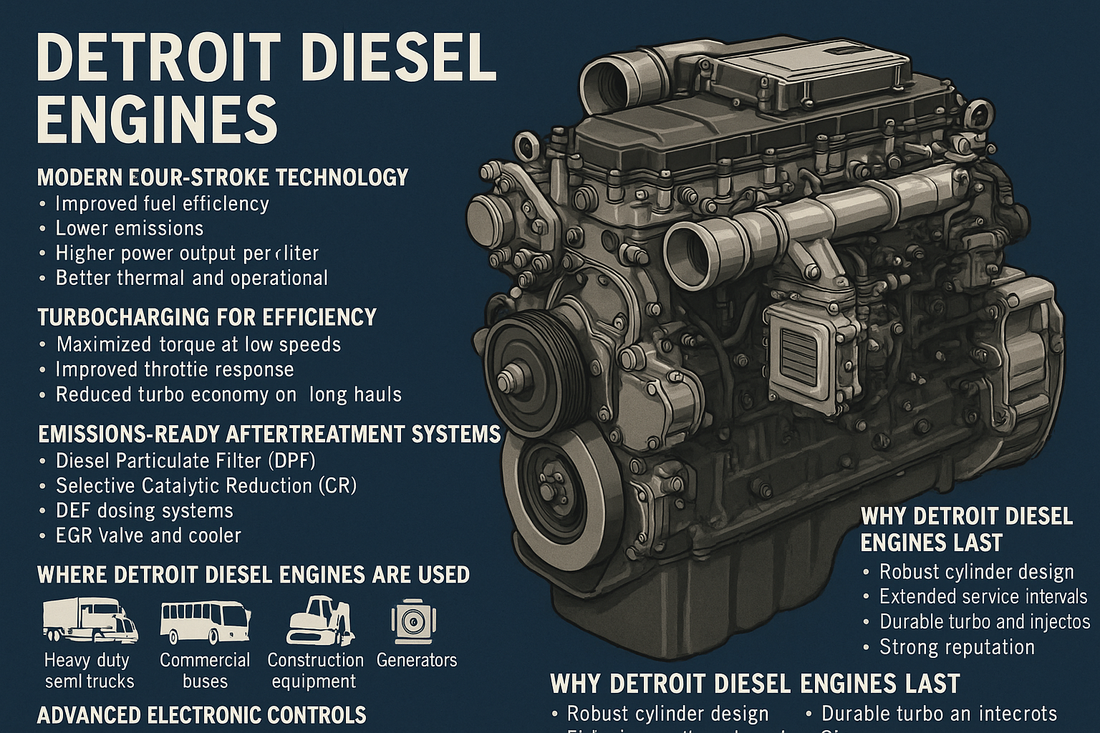
Detroit Diesel Engines: What Makes Them a Leader in Heavy-Duty Performance
Share
Detroit Diesel engines are widely respected in the commercial trucking and industrial world for their power, reliability, and advanced engineering. As a division of Daimler Trucks North America, Detroit has evolved from its two-stroke legacy into a global leader in four-stroke, electronically controlled diesel engine technology.
Whether you’re managing a fleet or operating your own truck, understanding how Detroit Diesel engines work — and how to maintain them — can help you get more miles, fewer breakdowns, and better performance on every haul.
Key Features of Detroit Diesel Engines
Modern Four-Stroke Technology
Detroit’s current engine lineup uses four-stroke combustion, offering:
-
Improved fuel efficiency
-
Lower emissions
-
Higher power output per liter
-
Better thermal and operational stability
Popular models include the DD13, DD15, and DD16, powering everything from regional haulers to long-haul Class 8 trucks.
Turbocharging for Efficiency
Most Detroit engines use variable-geometry turbochargers (VGTs) to boost air intake and optimize combustion under all loads and RPM ranges. This helps:
-
Maximize torque at low speeds
-
Improve throttle response
-
Reduce turbo lag
-
Enhance fuel economy on long hauls
Emissions-Ready Aftertreatment Systems
To meet EPA standards, Detroit Diesel engines are equipped with:
-
Diesel Particulate Filters (DPF)
-
Selective Catalytic Reduction (SCR)
-
DEF dosing systems
-
EGR valves and coolers
These systems work together to cut down NOx and soot emissions — but also require routine diagnostics and maintenance to avoid costly derates or forced shutdowns.
Advanced Electronic Controls
Each Detroit engine uses an ECM (Electronic Control Module) that manages:
-
Fuel injection timing
-
Turbo control
-
Regen cycles
-
Sensor data
-
Fault codes and diagnostics
With the right tools (like our NoFeeDiesel diagnostic kits), you can read codes, adjust parameters, perform regens, and monitor live engine data just like a dealer would — no subscriptions required.
Where Detroit Diesel Engines Are Used
Detroit engines power:
-
Heavy-duty semi-trucks
-
Commercial buses and coaches
-
Construction equipment
-
Marine propulsion systems
-
Standby and mobile generators
From urban logistics to long-haul freight, they are built for tough jobs and high mileage.
Detroit Diesel Innovation Highlights
Some advanced features found in newer Detroit models include:
-
Predictive cruise control (uses GPS and terrain data to optimize fuel use)
-
Integrated powertrain technology (paired with Detroit DT12 transmissions)
-
Fuel-efficient combustion strategies
-
Smart aftertreatment controls that adapt to usage conditions
These innovations help fleets cut operating costs, reduce emissions, and improve uptime.
Why Detroit Diesel Engines Last
Detroit is known for:
-
Robust cylinder design
-
Extended service intervals
-
Durable turbo and injector systems
-
High-mileage ECM tuning
-
A strong reputation in the fleet industry
Combined with proper maintenance and diagnostics, Detroit engines are built to last beyond a million miles.
Maintain Detroit Engines Like a Pro
At NoFeeDiesel, we help you unlock dealer-level access with:
-
Diagnostic laptops with Detroit-compatible software
-
RP1210 adapters for fault code reading and regen control
-
Parameter tuning tools — with no subscriptions or VIN locks
